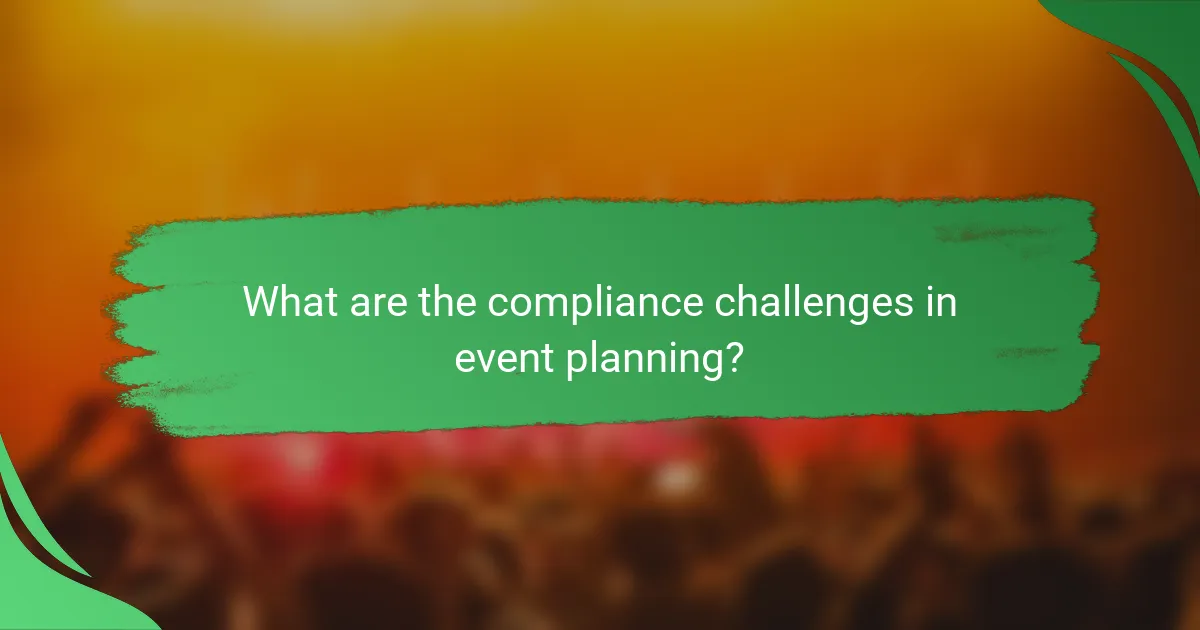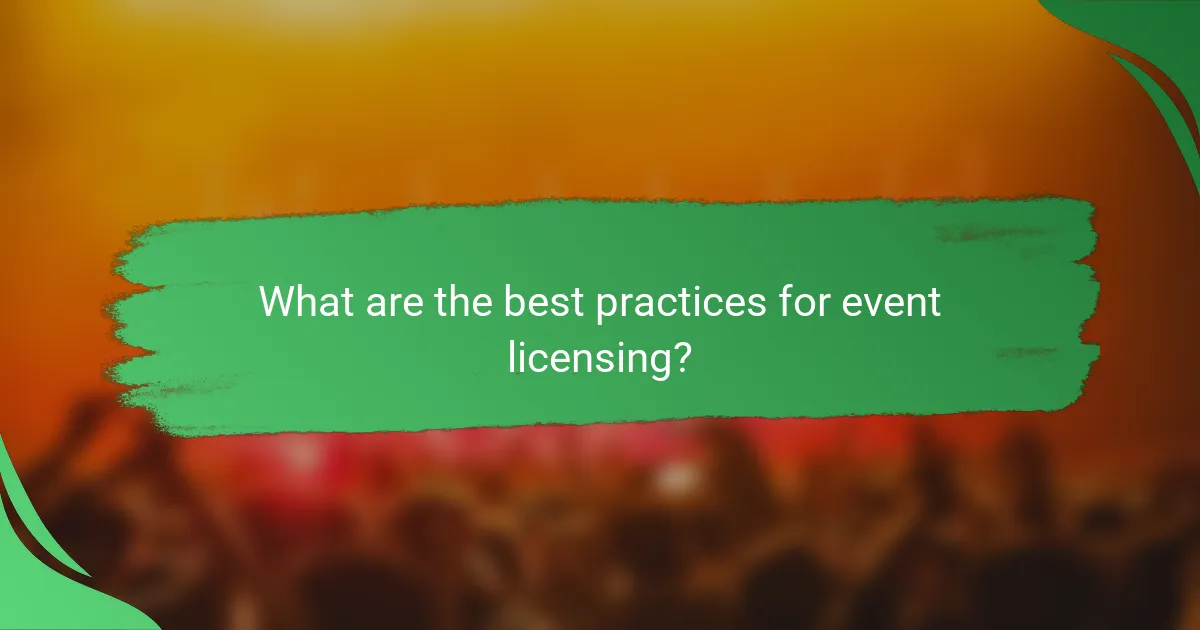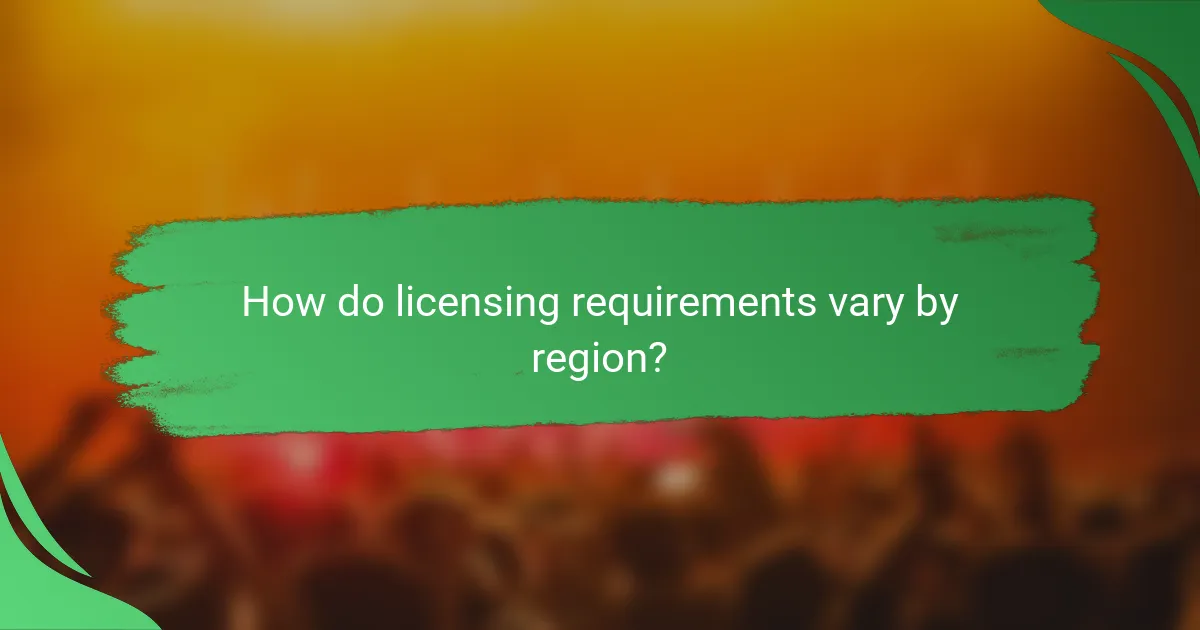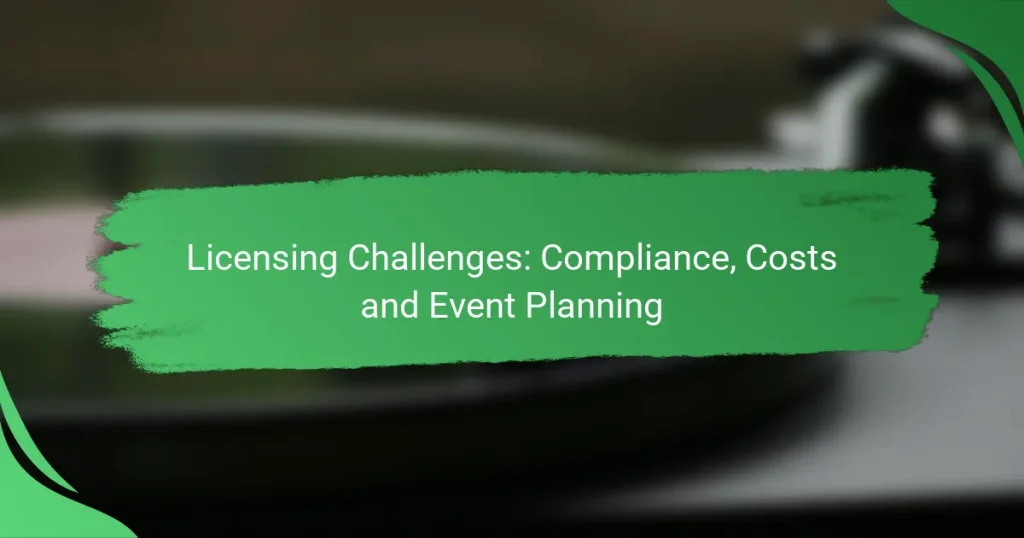Licensing challenges in event planning can pose significant hurdles, particularly regarding compliance with local regulations and permit management. Understanding these complexities is crucial for planners to ensure the feasibility and success of their events. By adopting strategic approaches to optimize licensing processes and leveraging available resources, businesses can effectively manage costs while maintaining compliance. Implementing best practices, such as thorough research and legal consultation, further minimizes risks associated with non-compliance.

What are the compliance challenges in event planning?
Compliance challenges in event planning often revolve around understanding and adhering to various local regulations, licensing requirements, and permit management. These challenges can significantly impact the feasibility and success of an event, making it essential for planners to navigate them effectively.
Understanding local regulations
Local regulations can vary widely depending on the location of the event. Planners must familiarize themselves with laws regarding noise levels, crowd control, and health and safety standards. For example, some cities may have strict noise ordinances that limit sound levels during specific hours.
Additionally, zoning laws may dictate where certain types of events can be held, requiring planners to verify that their chosen venue complies with local zoning regulations. Engaging with local authorities early in the planning process can help identify any potential issues.
Navigating licensing requirements
Licensing requirements are crucial for ensuring that an event operates legally. Depending on the nature of the event, planners may need various licenses, such as alcohol permits, food service licenses, or entertainment permits. Each license has its own application process and timeline, which can vary from a few weeks to several months.
It’s advisable to compile a checklist of required licenses based on the event type and location. This proactive approach helps avoid last-minute complications that could jeopardize the event.
Managing permits for venues
Securing the necessary permits for venues is a critical part of event planning. This process typically involves submitting applications to local authorities and may require detailed information about the event, including expected attendance, layout, and safety measures. Some venues may have their own permit requirements, adding another layer of complexity.
To streamline this process, planners should establish a timeline for permit applications and follow up regularly with authorities. It’s also beneficial to maintain open communication with venue management to ensure all necessary permits are in place before the event date.

How can businesses reduce licensing costs?
Businesses can reduce licensing costs by adopting strategic approaches that optimize their licensing processes and leverage available resources. By focusing on technology, negotiating effectively, and forming local partnerships, companies can achieve significant savings while ensuring compliance.
Leveraging technology for efficiency
Utilizing technology can streamline licensing processes, reducing both time and costs. Software solutions that automate compliance tracking and reporting can minimize manual errors and labor hours, leading to lower operational expenses.
Consider investing in cloud-based platforms that offer scalable licensing management tools. These systems often come with features like real-time updates and analytics, helping businesses make informed decisions about their licensing needs.
Negotiating bulk licensing agreements
Negotiating bulk licensing agreements can lead to substantial cost reductions. By purchasing licenses in larger quantities, businesses may secure discounts or better terms from vendors, which can significantly lower per-license costs.
When approaching negotiations, research market rates and prepare to present your business’s projected needs. This preparation can strengthen your position and help you achieve favorable terms that align with your budget.
Utilizing local partnerships
Forming partnerships with local businesses can provide access to shared resources and reduce licensing costs. Collaborating with local firms may allow for joint licensing agreements, which can be more economical than individual purchases.
Additionally, local partners may have insights into regional regulations and compliance requirements, helping to navigate the licensing landscape more effectively. This knowledge can prevent costly mistakes and streamline the licensing process.

What are the best practices for event licensing?
Best practices for event licensing involve thorough research, legal consultation, and a structured compliance checklist. These steps help ensure that all necessary permits and regulations are met, minimizing risks and costs associated with non-compliance.
Conducting thorough research
Conducting thorough research is crucial for understanding the specific licensing requirements for your event. This includes identifying local regulations, necessary permits, and any restrictions that may apply based on the event type and location.
Start by checking with local government websites or offices to gather information on event licensing. Consider reaching out to other event organizers in your area for insights on their experiences and any challenges they faced.
Engaging legal counsel
Engaging legal counsel can provide invaluable guidance in navigating the complexities of event licensing. A lawyer with experience in event planning can help interpret regulations and ensure compliance with local laws.
Consulting with legal experts early in the planning process can save time and money by identifying potential issues before they arise. They can assist in drafting contracts and agreements that protect your interests and comply with applicable laws.
Implementing a compliance checklist
Implementing a compliance checklist is an effective way to keep track of all necessary licenses and permits required for your event. A checklist helps ensure that nothing is overlooked and that all deadlines are met.
Your checklist should include items such as application deadlines, required documents, fees, and any inspections needed. Regularly review and update the checklist as your event planning progresses to maintain compliance and avoid last-minute issues.

What are the key factors in selecting a venue?
Selecting a venue involves several critical factors, including licensing status, accessibility, capacity, and location. Each of these elements plays a significant role in ensuring that the event runs smoothly and complies with local regulations.
Assessing venue licensing status
Before finalizing a venue, verify its licensing status to ensure it meets local regulations for hosting events. This includes checking for necessary permits, alcohol licenses, and health and safety certifications.
Contact local authorities or the venue management to obtain documentation proving compliance. Failure to secure a properly licensed venue can lead to fines or event cancellations.
Evaluating accessibility and capacity
Accessibility is crucial for accommodating all guests, including those with disabilities. Ensure the venue has features such as ramps, elevators, and accessible restrooms.
Capacity is equally important; choose a venue that comfortably fits your expected number of attendees. A good rule of thumb is to allow for about 10 square feet per person for standing events and 15 square feet for seated gatherings.
Considering location and logistics
The venue’s location affects attendance and logistics, so consider its proximity to public transport, parking availability, and nearby accommodations. A central location often increases accessibility for guests.
Evaluate logistical aspects such as load-in and load-out access for vendors, as well as the venue’s infrastructure for audiovisual needs. Planning these details in advance can prevent last-minute complications on the event day.

How do licensing requirements vary by region?
Licensing requirements differ significantly across regions, influenced by local laws, industry standards, and government policies. Understanding these variations is crucial for event planners to ensure compliance and avoid costly penalties.
Differences in state regulations
Each state in the U.S. has its own set of licensing regulations that can affect event planning. For example, some states require specific permits for alcohol sales, while others may have different rules for public gatherings. It’s essential to research the regulations in the state where the event will take place, as non-compliance can lead to fines or event cancellations.
Additionally, states may have varying fees associated with obtaining these licenses. Costs can range from a few hundred to several thousand dollars, depending on the type of event and the required permits. Always budget for these expenses when planning an event.
Local government policies
Local governments often impose additional licensing requirements that can differ from state regulations. City or county ordinances may dictate noise levels, zoning laws, and health regulations that must be adhered to during events. For instance, a city might require a special event permit for gatherings in public parks, which includes specific conditions that must be met.
It’s advisable to consult with local authorities early in the planning process to understand these policies. Engaging with local officials can help identify any potential hurdles and streamline the permitting process, ensuring a smoother event execution.


